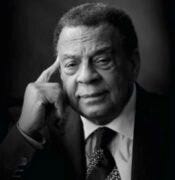Andrew Young on MLK and Making a Difference
Recently I was given an incredible gift. I had the opportunity to spend four hours with Andrew Young. His list of accomplishments is long. To list only a few, he was a pastor, a close associate of Martin Luther King, Jr. during the civil rights movement, a U.S. Congressman from Georgia, and was appointed by President Jimmy Carter to be the U.S. Ambassador to the United Nations. Also, he was the Atlanta mayor instrumental in bringing the 1996 Olympics to Atlanta.
During our afternoon conversation, he talked and I listened. I learned so much about life and leadership. In this series of posts, I will share what I learned from this man of God. He is a great leader who has made history multiple times. To read the rest of this series, visit paparelli.com and subscribe.
“Martin believed we all needed to come to Jesus in order to receive the Spirit of God. After that, we will be led by the Spirit of God.” Andrew Young was speaking about Martin Luther King, Jr.
He went on, “Martin was very intense.
"He believed he was not going to live a long life. Because of this, he worked 14 to 16 hours a day. He didn’t waste a minute of time. He told me more than once while we were working together, 'If I can make it to 40, I can make it to 100.' He was shot and killed at age 39 while on the balcony of a small Memphis motel.
“I remember the day he was killed. He was in a very light-hearted mood. This mood was very uncharacteristic of him. Little did I know that was the last time I would see him alive as I looked up at him standing on the balcony above me.
“A short time later, I heard what I thought were firecrackers going off. I came back out and looked up at the balcony and saw Martin’s foot sticking out through the railing. It didn’t have a shoe.
“I ran up to his room and then out to the balcony.
“There he lay in a pool of blood, dead. But he looked more at peace as he lay there than any other time I ever saw him.”
MLK was a man who shaped Andrew Young’s life. Before they worked together in the civil rights movement, they both read and were impacted by the lifework of Mahatma Ghandi. Social change through peaceful demonstration. They both believed in it but didn’t know what to do with this principle. By working together, they influenced each other.
They grew together as leaders.
MLK took the lead. He integrated Ghandi’s message with the teachings of Jesus Christ. He stepped into the breach and stepped out of the pulpit. He began to live the messages he preached. He used the Gospel of Jesus Christ and the principles demonstrated by Ghandi to change a nation. This put him and all his followers in harm’s way. He paid the highest price for equality for all men and peace among all men.
I was attracted to Andrew Young while sitting in a large audience watching him accept a lifetime leadership award. He only talked for five minutes, but in those five minutes, I heard the words of a great leader. A leader who is authentically humble and sold out for Jesus Christ.
He said, “When I graduated from college, I was confused. I didn’t want to be a dentist like my father, but I wasn’t sure what I should do. As I looked around, I realized God made everything, and he made it with a unique purpose. It was then I realized God made me with a purpose. I no longer belonged to my mother and father. I belonged to God.”
This realization set the course of his life.
He was filled with God’s Spirit and decided right there and then to follow the Spirit. MLK was right. The Spirit will lead you. Look where it led this great man. He changed a city, a nation, and the world.
One thing he said that I’ll never forget:
“People of influence who are in the same place want to be at peace with each other and work together for a better society. This is true if we see the ‘same place’ as the world, a nation, a city, or a neighborhood. We need to make Atlanta the international City of Peace. How we get along as brothers and sisters is of utmost importance; otherwise we will perish together as fools.”
Andrew Young
This statement sums up his life’s work and his purpose. This makes me ask, “What statement sums up your life’s work and purpose?”



